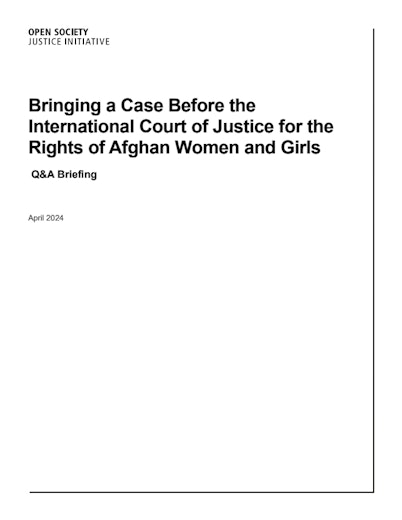Human Rights Monitoring Institute v. Republic of Lithuania
Demanding the Truth about Secret Detention Flights in Lithuania
The Lithuanian Customs Department refused requests to disclose information that may have exposed Lithuania’s complicity in the CIA extraordinary rendition and secret detention programs. The Open Society Justice Initiative and the Human Rights Monitoring Institute (HRMI) challenged Lithuania’s refusal before the European Court of Human Rights. However, the European Court of Human Rights found the case inadmissible on the grounds that HRMI was not directly affected by the violations alleged and, therefore, did not have standing to bring the claim.
Facts
Beginning in 2009 reports surfaced that Lithuania hosted a secret CIA prison that reportedly held up to eight “high value detainees” until late 2005. Additional reports showed that flights associated with secret CIA detention landed in Vilnius between 2004 and 2005 and a lawsuit filed on behalf of a detainee alleged, among other things, that Lithuania participated in and provided cover for the transfer of detainees into and out of Lithuania.
The Lithuanian Parliament conducted an inquiry into Lithuania’s participation in the CIA secret detention program. It concluded that two potential detentions facilities existed in Lithuania but was unable to confirm that detainees were held there. Notably, the report stated that on three occasions State Security Department Officers permitted aircraft to enter its territory without inspection of their contents.
On July 4, 2011, HRMI, which has acted as a human rights watchdog in Lithuania, submitted a freedom of information request to the Lithuanian Customs Department, seeking disclosure of general aircraft and cargo inspection procedures. It also requested information relating to the customs inspection of specific flights, that HRMI identified by tail number, associated with the CIA secret detention and extraordinary rendition program.
The Customs Department denied the request in its entirety stating that the information was confidential. It did not consider the significant public interest associated with the disclosing the information relating to possible human rights violations on Lithuanian territory. It also did not attempt to determine whether it could disclose part, but not all of the information. On July 2, 2012, the Supreme Administrative Court (SAC) upheld the Customs Department’s decision to withhold the information. With regard to the general aircraft and cargo inspection procedures it found that the request was not sufficiently specific. With regard to the specific flights that had been publicly associated with the CIA’s secret detention and extraordinary rendition program, the SAC found that the information was confidential and could not be disclosed to third parties.
On December 20, 2012, HRMI and the Open Society Justice Initiative filed an application before the European Court of Human Rights (ECHR), alleging that by withholding the requested information, the Lithuanian government has violated HRMI’s right to information and right to an effective remedy.
Open Society Justice Initiative Involvement
The Open Society Justice Initiative acted as co-counsel with the Human Rights Monitoring Institute in the application.
Arguments
Right to Information. The reliance on a blanket ban to refuse access to information without any individualized consideration of the circumstances of the case was an unjustified and disproportionate interference with Article 10 of the European Convention on Human Rights.
Right to an Effective Remedy. The lack of an effective domestic remedy by which to challenge the refusal to disclose Customs Department information in the public interest violated Article 13 of the European Convention.
On March 13, 2013, in a finding by a single judge, the European Court of Human Rights ruled that the case was inadmissible.
In the decision the Court stated that the applicant had not been directly affected by the violations alleged, but did not further elaborate on its findings. The Open Society Justice Initiative subsequently requested reconsideration but the Court did not reopen the case.
The determination in this case was a departure for the Court, which had in previous instances found that NGOs acting as social watchdogs did have standing to bring claims involving access to information in the public interest. For example, in Társaság a Szabadságjogokért v. Hungary, which involved the Hungarian Constitutional Court’s refusal to disclose information regarding the legality of a new criminal law on drug-related offences to the Hungarian Civil Rights Union (HCLU), the Court found that the HCLU had standing under Article 10 to request and obtain access to relevant information held by a public authority, and to make such information available to the general public. In particular, the Court held that there was no requirement that the applicant be directly affected beyond its resulting inability to act as a social watchdog and contribute to an informed public debate. Similarly, in the months prior to its decision in HRMI, the Court found another application, Magyar Helsinki Bizottság v. Hungary, involving a denial of access to information to an NGO admissible (and the Grand Chamber has since ruled that applicants, including watchdogs, have the right to access information for public interest purposes under Article 10).
The Open Society Justice Initiative has obtained successful judgments from the European Court of Human Rights regarding the CIA extraordinary rendition and secret detention programs, including findings of Article 13 violations, in El-Masri v. Macedonia and Al-Nashiri v. Poland.
The Open Society Justice Initiative files a letter requesting the European Court of Human Rights to reconsider its finding of inadmissibility.
The European Court of Human Rights finds the case inadmissible on the basis that the applicant was not directly affected by the violations under the European Convention on Human Rights.
HRMI and the Open Society Justice Initiative file the application before the European Court of Human Rights.
The Supreme Administrative Court issues a final ruling upholding the Customs Department’s decision to withhold information.
Lithuanian Customs Department denies the request on the grounds that the information was confidential.
HRMI submits freedom of information request to the Lithuanian Customs Department.
Office of the Prosecutor General declares the criminal investigation closed.
Office of the Prosecutor General opens criminal investigation.
Lithuanian Parliament concludes its inquiry into Lithuania’s participation in the CIA secret detention program.
Media reports state that Lithuania hosted a secret CIA prison.
Related Cases
El-Masri v. Macedonia
The European Court of Human Rights ruled in favor of Khaled El-Masri in his complaint over Macedonia's involvement in his extraordinary rendition and torture by the CIA.
Al-Nashiri v. Poland
The ECHR ruled in favor of Abd al-Rahim al-Nashiri, finding that Poland had allowed his illegal rendition, detention and torture at a secret prision run by the CIA.
Al-Nashiri v. Romania
The complaint calls for a proper investigation into Romania's responsibility for the CIA's abuse of Abd al-Rahim al-Nashiri at a secret prison on its territory and other violations of the European Convention on Human Rights.
Related Work
Q&A: German Court Demands Greater Scrutiny of U.S. Drone Attacks
For years, Germany has cooperated with the United States’ controversial use of drone strikes. A new court ruling may force the government to reassess.

Syrians Seek UN Rights Ruling against Russia for 2019 Hospital Attacks
A legal complaint seeks justice for Syrian victims of attacks by the Russian air force, and seeks to reinforce protections for health care facilities in war-time.
Q&A: Bringing a Case Before the International Court of Justice for the Rights of Afghan Women and Girls
This paper considers 21 questions around the feasibility of bringing a complaint at the International Court of Justice against Afghanistan's Taliban for egregious and prevalent violations of women’s and girls’ rights.
